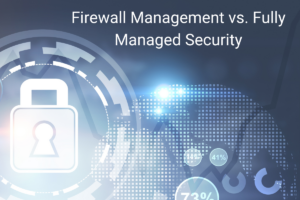As businesses increasingly rely on digital platforms to operate, the importance of cybersecurity has skyrocketed. Cyber threats—such as data breaches, ransomware, and phishing scams—pose significant risks to businesses of all sizes. These threats can result in lost data, financial damage, and compromised customer trust. For companies seeking IT services, understanding cybersecurity is crucial to safeguarding their operations and staying resilient against evolving threats.
In this post, we’ll explore why cybersecurity is critical for modern businesses, discuss key strategies to implement, and explain how iT360 can assist in fortifying your defenses.

Why Cybersecurity Matters for Your Business
In the digital era, businesses store vast amounts of sensitive data, from customer information to financial records. A cybersecurity breach can expose this data, resulting in financial losses, reputational damage, and potential legal penalties. Whether you run a small business or a large enterprise, the impact of a cyberattack can be devastating.
Here are a few key reasons why cybersecurity is essential for businesses:
- Protecting Sensitive Data: Every business holds valuable data, including customer payment information, employee records, and confidential business plans. Hackers often target this data for resale on the dark web or to demand a ransom. Implementing cybersecurity measures helps safeguard this information and reduce the risk of data theft.
- Ensuring Business Continuity: A cyberattack can disrupt your business by halting operations. Ransomware, for example, can lock you out of your systems until a ransom is paid. This downtime costs businesses not only financially but in lost opportunities. Robust cybersecurity measures ensure minimal downtime, enabling your business to continue even in the face of an attack.
- Maintaining Customer Trust: Customers trust businesses to keep their personal information safe. If a breach occurs, that trust can be severely damaged, resulting in lost customers and a tarnished reputation. Strong cybersecurity practices help maintain customer confidence by showing that you take data protection seriously.
- Compliance with Regulations: Many industries have strict regulations regarding data protection and cybersecurity. Compliance with standards such as GDPR, HIPAA, or PCI-DSS is mandatory to avoid legal fines and penalties. Implementing effective cybersecurity practices helps ensure your business complies with relevant laws.
Key Benefits of Cybersecurity
- Safeguards Sensitive Information: Protects confidential business data, customer records, and financial information from unauthorized access and theft by cybercriminals.
- Ensures Operational Continuity: Mitigates the risk of operational disruption caused by malware or ransomware attacks, keeping your business running smoothly.
- Builds Customer Trust: Customers value privacy and security. Strong cybersecurity practices help maintain and strengthen customer confidence in your brand.
- Reduces Financial Risks: Cyberattacks can result in significant financial losses, including legal costs, fines, and lost revenue. Investing in cybersecurity helps minimize these risks.
Common Cybersecurity Threats Businesses Encounter
Identifying various cyber threats is essential for building a solid cybersecurity defense. Here are some other significant risks that businesses should be aware of:
- Insider Threats: Insider threats can arise from employees, contractors, or business partners who have legitimate access to your systems and data. Whether intentional or unintentional, these individuals can inadvertently expose sensitive information or compromise security protocols, leading to data breaches or operational disruptions.
- Distributed Denial-of-Service (DDoS) Attacks: DDoS attacks overwhelm a business’s servers with an influx of traffic, rendering the systems inoperable and disrupting services. This can lead to significant downtime, impacting customer trust and causing financial losses.
- IoT Vulnerabilities: As more businesses integrate Internet of Things (IoT) devices, they also face unique security challenges. Many IoT devices lack robust security features, making them vulnerable to attacks that can compromise an entire network or allow unauthorized access to sensitive data.
- Credential Stuffing: Credential stuffing involves cybercriminals using stolen usernames and passwords from one breach to gain access to accounts on different platforms. Since many individuals reuse passwords across multiple sites, this practice can lead to unauthorized access to corporate systems and data breaches.
- Supply Chain Attacks: Supply chain attacks target third-party vendors or service providers to infiltrate a business’s network. Cybercriminals exploit vulnerabilities in these external systems to access sensitive information or disrupt operations, making it crucial for businesses to vet their partners’ security measures.
If you want to check this in depth you can Read More.
How iT360 Can Help Your Business Stay Safe
At iT360, we specialize in helping businesses of all sizes develop and implement robust cybersecurity strategies. Our team of experts works with you to identify vulnerabilities, set up secure systems, and train your staff to be proactive in the fight against cyber threats.
Take the First Step Toward Cybersecurity Excellence
Don’t wait until a cyberattack occurs—be proactive in protecting your business today. Partner with iT360 to build a strong cybersecurity framework that shields your data, systems, and reputation from evolving cyber threats.
Contact us today to learn how we can tailor a cybersecurity strategy to meet your business needs and ensure you stay secure in the digital age.


